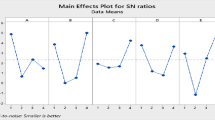Abstract
The flexible jobshop scheduling problem permits the operation of each job to be processed by more than one machine. The idea is to assign the processing sequence of operations on the machines and the assignment of operations on machines such that the system objectives can be optimized. The assignment mentioned is a difficult task to implement on real manufacturing environments because there are many assumptions to satisfy, especially when the amount of work is not constant or sufficient to keep the manufacturing process busy for a long time, causing intermittent idle times. An estimation of distribution algorithm-based approach coupled with a simulation model is developed to solve the problem and implement the solution. Using the proposed approach, the shop performance can be noticeably improved when different machines are assigned to different schedules.
Similar content being viewed by others
References
Mühlenbein H, Paaß G (1996) From recombination of genes to the estimation of distributions: I. Binary parameters. Parallel problem solving from nature PPSN IV, 178–187
Chen SH, Chen MC, Chang PC, Zhang Q, Chen YM (2010) Guidelines for developing effective estimation of distribution algorithms in solving single machine scheduling problems. Expert Syst Appl 37:6441–6451
Liu H, Gao L, Pan Q (2011) A hybrid particle swarm optimization with estimation of distribution algorithm for solving permutation flowshop scheduling problem. Expert Syst Appl 38:4348–4360
Pan QK, Ruiz R (2012) An estimation of distribution algorithm for lot-streaming flow shop problems with setup times. Omega 40:166–180
Chen SH, Chang PC, Cheng T, Zhang Q (2012) A self-guided genetic algorithm for permutation flowshop scheduling problems. Comput Oper Res 39:1450–1457
Wang L, Wang S, Xu Y, Zhou G, Liu M (2012) A bi-population based estimation of distribution algorithm for the flexible job-shop scheduling problem. Comput Ind Eng 62:917–926
Chen YM, Chen MC, Chang PC, Chen SH (2012) Extended artificial chromosomes genetic algorithm for permutation flowshop scheduling problems. Comput Ind Eng 62:536–545
Jarboui V, Eddaly M, Siarry P (2009) An estimation of distribution algorithm for minimizing the total flow time in permutation flowshop scheduling problems. Comput Oper Res 36:2638–2646
Zhang Y, Li X (2011) Estimation of distribution algorithm for permutation flow shops with total flowtime minimization. Comput Ind Eng 60:706–718
Chan FTS, Wong TC, Chan LY (2006) Flexible job-shop scheduling problem under resource constraints. Int J Prod Res 44(11):2071–2089
Wadhwa S, Rao KS, Chan FTS (2005) Flexibility-enabled lead-time reduction in flexible systems. Int J Prod Res 43(15):3131–3162
Chan FTS, Chung SH (2004) A multi-criterion genetic algorithm for order distribution in a demand driven supply chain. Int J Comput Integr Manuf 17(4):339–351
Chan FTS (2001) The effects of routing flexibility on a flexible manufacturing system. Int J Comput Integr Manuf 14(5):431–445
Peña J, Robles V, Larrañaga P, Herves V, Rosales F, Pérez M (2004) Ga-eda: hybrid evolutionary algorithm using genetic and estimation of distribution algorithms. Innovations in Applied Artificial Intelligence. Berlin/Heidelberg
Shim VA, Chen Tan K, Yong Chia J, Kiat Chong J (2011) Evolutionary algorithms for solving multi-objective travelling salesman problem. Flex Serv Manuf J 23:207–241
Yan Y, Wang G (2007) A job shop scheduling approach based on simulation optimization. Proceedings of the 2007 I.E. IEEM
Sargent R (2007) Verification & validation of simulation models. Proceedings of the 2007 Winter Simulation Conference
Whitner R, Balci O (1989) Guidelines for selecting and using simulation model verification techniques. Proceedings of the 1989 Winter Simulation Conference. Washington
Pita J, Wang Q (2010) A simulation approach to facilitate manufacturing system design. Int J Simul Model 9–3:152–164
Greenwood A, Vanguri S, Eksioglu B, Jain P, Hill T, Miller J, Walden C (2005) Simulation optimization decision support system for ship panel shop operations. Proceedings of the 2005 Winter Simulation Conference
Rudolph G (1991) Global optimization by means of distributed evolution strategies. Parallel problem solving from nature PPSN I. Lectures notes in computer science
Bean J, Norman B (1993) Random keys for job shop scheduling problem. The University of Michigan
Larrañaga P, Exteberria R, Lozano J, Peña J (2000) Optimization in continuous domains by learning and simulation of Gaussian networks. Proceedings of the 2000 Genetic and Evolutionary Computation Conference Workshop Program
De Bonet J, Isbell C, Viola P (1997) MIMIC: finding optima by estimation probability densities. Adv Neural Inf Process Syst 9
Baluja S, Davies S (1997) Combining multiple optimization runs with optimal dependency trees. Carnegie Mellon University
Pinedo M (2001) Scheduling. Springer Science + Business Media, New York
Whitley D, Starweather T, Shaner D (1990) The traveling salesman and sequence scheduling: quality solutions using genetic edge recombination. In: L. Davis (Ed.), Handbook of genetic algorithms, (pp. 350–372). New York
Author information
Authors and Affiliations
Corresponding author
Rights and permissions
About this article
Cite this article
Pérez-Rodríguez, R., Jöns, S., Hernández-Aguirre, A. et al. Simulation optimization for a flexible jobshop scheduling problem using an estimation of distribution algorithm. Int J Adv Manuf Technol 73, 3–21 (2014). https://doi.org/10.1007/s00170-014-5759-x
Received:
Accepted:
Published:
Issue Date:
DOI: https://doi.org/10.1007/s00170-014-5759-x




